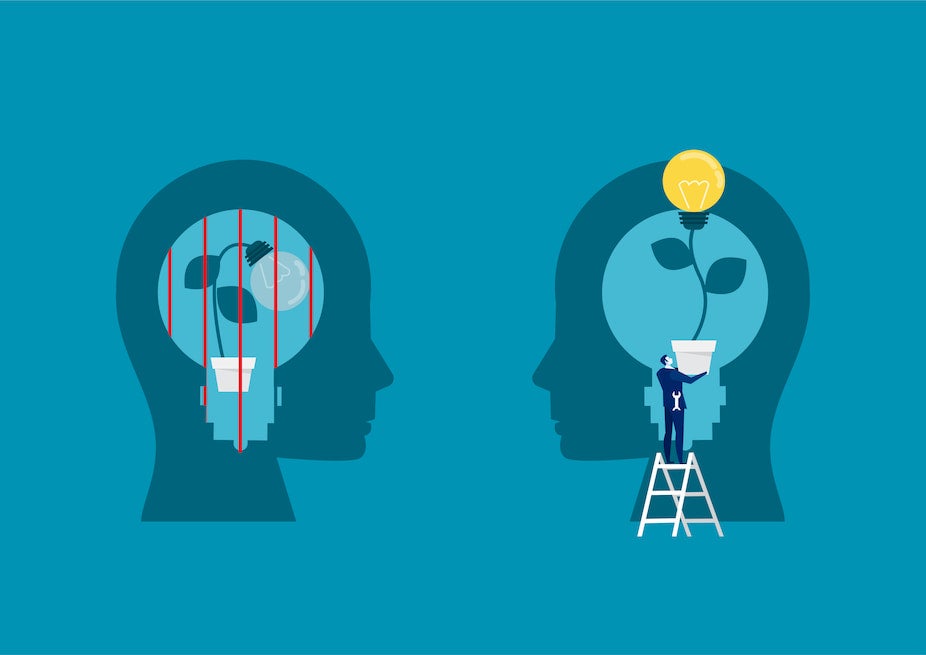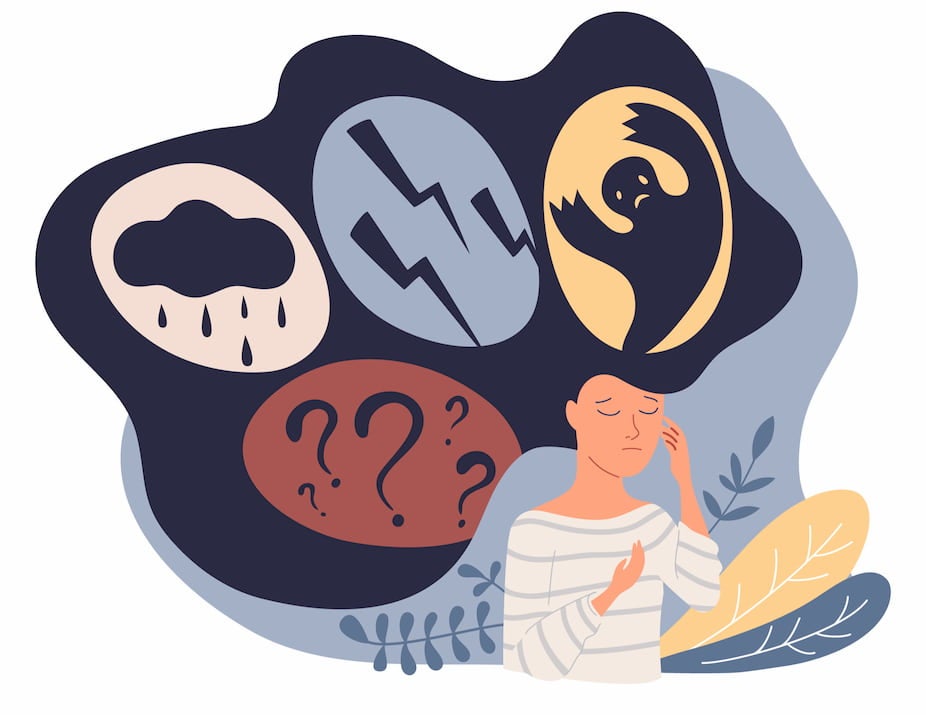
This one goes out to the 180,000 young Australians who have recently finished their final Year 12 exams and found themselves thrust into the post-high school world.
Despite the fact that you’re all absolute champions for enduring the impacts of a global pandemic to finish your schooling career, you are unfortunately now entering a new era saturated with COVID-19-esque bumps in the road.
While some of you may be able to ride this rollercoaster and embrace the various significant life changes afoot, others may not be feeling as carefree. For some of you, or your mates, the stress of change and working out what to do next may bring about unhelpful amounts of stress.
So, how are you feeling right now?

Is the buzz of wrapping up 13 years of schooling enough to dampen any trepidations about the impact of COVID-19 on your university course choices, job opportunities and travel plans?
Or, does the old adage ‘it’s the dawn of a new era’ seem a little ironic and lack its usual pizzazz for you?
A nationally representative study amongst 519 Year 12 students, undertaken for DrinkWise in October 2020, showed:
- 65% rated this year as more difficult than they expected
- 48% don’t feel good about what’s happening in their life
- 48% don’t think they’re dealing with their problems well
- 41% are worried about their own mental health
- 11% (15% of 18-19s) are drinking alcohol or smoking to relieve stress and anxiety
- 4% have accessed professional support services when feeling anxious or stressed.
Let us assure you, any feelings of unease you’re experiencing right now are completely normal. Musings over life’s big changes is basically a rite of passage at your age.
So, how can we distinguish between a normal amount of stress and unhelpful stress that suggests you, or a mate, is really struggling with the stress brought about by change?
We spoke to My Mirror’s Chief Psychologist, Kate Blundell, to get some tips on how to self-assess your (or a mate’s) emotions, thoughts and behaviours, and how to reach out if you, or a mate, needs help addressing mental health concerns - particularly during significant periods of change.
Change is difficult (COVID or no COVID)

Blundell says any form of significant change, adjustment or move outside of our comfort zone is challenging and often brings with it some hesitation and stress.
“There’s this general sense that finishing school is meant to be all fireworks and excitement. However, for many young people, if not most young people, this end of an era is also a dive into the unknown,” explains Blundell.
“What will I do next year? Where will I live? What adult responsibilities lie over the horizon? These questions are all normal. If you’re feeling worried, it’s okay because that’s normal. This makes you the rule, not the exception!” she adds.
Blundell adds that when we navigate our way through unnaturally challenging circumstances, such as those created by COVID-19, our natural ability to cope is compromised.
“It is normal to grieve the loss of rites of passage, crave stolen moments of comradery between mates and feel confused about the lack of celebration about moving into adulthood,” Blundell explains.
This unease about the loss of being able to celebrate life’s changes can build up and lead to unhelpful amounts of stress, worry and also low mood.
What is stress?

When we encounter any type of stressful situation, including significant or ongoing change, the body’s typical protective response is stress.
This stress response is often referred to as our ‘fight or flight’ response. The ‘fight or flight’ is our alarm system and our body’s way of readying us for action when we encounter a threatening trigger (physical or psychological).
Blundell says we can imagine the ‘fight or flight’ response from an evolutionary perspective to understand it more easily.
“Imagine a group of cave people sitting by a fire. One of them notices a saber tooth tiger lurking in the shadows. This threat (the tiger) triggers the alarm and ‘fight or flight’ response. In this case, their breathing rate might increase, their heart may beat faster and they might feel a bit sick in the stomach. They could either get the hell out of there and away from the threat or fight it off,” explains Blundell.
“Now, imagine your body didn’t respond in this way: you see the tiger and respond, ’Ah, that’s interesting...You’re dinner.’, ” adds Blundell.
Constant change can create high levels of stress which if ongoing can be very uncomfortable and lead to other challenges like emotional burnout, anxiety and even depression. However, in short-bursts stress can actually be extremely helpful (not just when a predator lurks).
Not all stress is unhelpful or harmful
Contradictory to the stigma around stress, not all stress is unhelpful or harmful.
As mentioned, stress can be a protective mechanism and therefore in some circumstances can provide us with more:
- Energy and strength in physically demanding situations
- Composure in serious situations where someone’s safety might be compromised
- Focus, concentration and vigilance in situations where the pressure is on to perform or be productive
Causes of harmful stress
There’s no doubt that transitioning into life after high school is a significant life change, and one that may bring with it a considerable amount of stress.
This stress might come from thoughts about:
- Going to university and/or getting a job
- How to become financially stable
- Maintaining childhood relationships
- Developing a sense of belonging in your new worlds and roles
- Others’ expectations
- General worry about uncertainty
It should be pointed out that we all perceive our stressors differently.
Blundell says we all have different tolerance levels for stressful situations and the situations that cause stress differ greatly from person to person.
“For example, organising a birthday party for 20 friends might make me sweat, but others might be excited by this prospect,” she explains.
“While university deadlines and pressure may feel crippling to some, others are motivated and produce their best work when under pressure. It’s just so variable. Basically, the causes of harmful stress are different for everyone,” adds Blundell.
Common external stress factors (negative and positive)

- Work/university
- Relationships and families
- Major life changes or accomplishments such as getting married and buying a house
- Financial position
- Internalised dialogue, worrying about factors outside of your control or being cynical and distrustful
Common internal stress factors (negative and positive)

- Negativity towards others and self
- Fastidiousness or an idealistic outlook on life
- High and unrelenting standards for self and others
- Aversion to change
- Fixed mindset
- A strong dislike of uncertainty
- Overthinking
The above internal factors can contribute to an increase in unhelpful stress brought about by a situation. It’s not necessarily a situation that is inherently stressful but our interpretation and response to it.
When stress negatively impacts your health

Worries and pressures that become an everyday influence and feel unmanageable can compromise our overall health. Chronic stress disrupts our nervous system and so, it is important to know how to recognise the signs and symptoms of unmanageable stress.
Our bodies find it difficult to distinguish between different types of stress and the more we feel apprehensive or distressed, the easier it is for seemingly small worries to trigger our stress response.
As we grow up and grow older, our life naturally become busier and commitments can begin to pile up. This, entwined with the unknowns of COVID-19, can be enough to feed prolonged distress.
Chronic stress can negatively impact our:
- Emotional health – stress can make us more vulnerable to anxiety and depression, and even lead to a change in perspective such as not being able to find as much joy in life or be grateful for the people and things around you
- Physical health – stress can weaken our immune systems, negatively impact our digestive system, cause weight issues, lead to bad sleeping habits, cause skin conditions, make us more receptive to pain, and even increase our chances of having a stroke or a heart attack
- Temperament – stress can heighten our nervous system making us more prone to irritability and outbursts
- Interactions and relationships – stress and concerns can get in the way of clear and helpful communication within relationships, and make us more sensitive to (or deter us from facing) confronting parts of relationships like addressing and working through conflict and expressing our needs
- Performance and efficiency at work – stress can lead to poor memory, procrastination, lack of inspiration and enjoyment about your line of work
For anyone experiencing an existing mental health concern or concerns – or even diagnosis – ongoing stress can exacerbate their symptoms.
Know the symptoms and recognise your struggle

Firstly, no one is able to withstand unmanageable amounts of stress. It just isn’t humanly possible. It is okay not to be okay.
So, when we’re not coping very well with adjustment and the strain that comes with it, our mind and body communicate this to us by way of some pretty clear emotional and physical signs.
Some of the first physical signs you might notice are muscle tension, tightness in your chest or shortness of breath, ongoing headaches or difficulty sleeping. You might also notice you’re more irritable and are feeling a bit overwhelmed.
Knowing the emotional and physical reactions to unhelpful amounts of stress can be the catalyst to help you know when to reach out to a loved one about your concerns and engage in some self-care.
Further to this, being able to check-in with yourself can help you identify the right time to talk to a professional to help you unpack your emotions, thoughts and behaviours, identify your stress triggers and develop the tools you need to face change and stress with courage and resilience.
Blundell says that the following are important emotional and behavioural signs you, or a mate, might be struggling with the high levels of stress due to change.
Emotional signs of unmanageable stress:

- Feeling constantly anxious, nervous or fearful – COVID-19 has left many of you with increasing worries about your future. Some worry is completely normal but those that lead to tightness in your chest, ongoing nervousness, causes your mind to race or catastophise things, or fear everyday activities is something you should speak to a loved one or even a psychologist about. Try Health Direct’s symptom checker.
- Feeling depressed, unhappy or moody – COVID-19 has prevented regular contact with friends, limited access to sporting, cultural and leisurely activities we cherish. This has limited social connectedness and our ability to reach out to our usual networks of support. This unnatural and uncontrollable change is difficult to process. Feeling irritable or down, when we’re coping with stress for a long period of time, is stressful, tiring and uses up cognitive and emotional resources. In addition, when our resource tank is running low, we’re more likely to be snappy or feel irritable and even start to feel a bit helpless and down. If you’re experiencing these changes, it’s a strong indicator that this level of stress is unhelpful and you may want to reach out to a psychologist to work through your emotions, thoughts and behaviours.
- Feeling worthless or lacking self-confidence – the impacts of COVID-19 may have generated concerns about your family’s financial position and your future employment opportunities. If this has left you or a mate experiencing constant concern and feelings of worthlessness, speaking to a psychologist can provide the tools to process and navigate life’s ups and downs.
- Feeling neglected or lonely – it may be the case that in the transition away from high school, you become distanced from those you once saw most days of the week. This is completely normal for the strengths of relationships to be tested during significant life changes. However, if this has left you feeling neglected or lonely, you might like to speak to a psychologist about unpacking your thoughts and building your resilience.
Cognitive signs of unmanageable stress:

- Unable to make decisions easily – our focus narrows when we become stressed and with high and unrelenting stress our emotional brain begins firing and overrides our thinking brain. These factors significantly impact our ability to think flexibly and easily, and effectively make decisions.
- Unable to concentrate – When we feel stressed, we often become hypervigilant, scanning the environment (both external and internal) for threat. This, along with the part of our brain that is running the show with unmanageable stress (as above) can significantly impact our cognitive resources and ability to concentrate.
- Negative thinking patterns – Our emotions also impact our thoughts. When managing high stress or worry, you’re more likely to notice thoughts like “What if”, thinking up worst-case scenarios and jumping to conclusions, and underestimating your ability to cope. These thinking patterns then form part of a negative cycle that maintains and exacerbates unhelpful stress.
Physical and behavioural signs of unmanageable stress:

- Frequent sickness – stress may reduce your immunity and make you more susceptible to infections and bugs. If you’re getting sick more frequently, it may be worth speaking to your GP for a check-up and to consider the possible impact of stress.
- Shifts in behaviour – with disruptions to daily structure, study routines and learning methods it is natural to feel increased frustration and concern. However, significant shifts in behaviour, like sleeping in past midday each day, could be indicators that you’re struggling more than usual and mean it is time to prioritise your mental wellbeing.
- Emotional outbursts – uncertainties about final exams, ATARs and future study were enough to rattle you before the COVID-19 pandemic but in 2020 the added concern about the uncertain future could bring about emotional outbursts.
- Decreased energy – a lack of energy can be caused by prolonged stress.
- Sleeping and eating habits – stress can negatively impact your sleep and even impact your eating habits. If you’re noticing this in yourself or a mate, reach out for support.
- Illnesses and aches – as previously mentioned, stress can lead to physical illness. So, prolonged anxiety that are causing you shortness of breath, headaches, feeling physically unwell, sore eyes, muscle aches or heart palpitations be a sign that your worry is unhelpful for your mental wellbeing.
- Change in sex drive – stress can have an impact where we might least expect it and our desire for sex, or lack of enjoyment from sex are included.
- Physical changes – sometimes stress leads to changes such as grinding your teeth unknowingly, ache or biting your nails
- Avoidance – stress can interrupt our lives so much that we might avoid loved ones and friends. When we start to feel overwhelmed or down we might feel the urge to withdraw and spend more time on our own. This can be a downward spiral and lead to further low mood and feelings of isolation.
- Substance use and/or abuse – we all know that using alcohol, smoking or other substances as coping mechanisms for stress and strain is unhealthy. However, when you’re young it might be difficult to know where to draw the line. This is why My Mirror has partnered with the DrinkWise ‘You Got This’ campaign, to support young Aussies through life’s big changes in a healthy way.
Why looking out for your mates is so important
The national study undertaken for DrinkWise in October 2020, revealed some statistics that suggest the importance of checking-in with your own mental health and looking out for the mental health of your mates and loved ones, helping them reach out for support if need be.
The survey revealed:
- 30% would not be comfortable accessing support services for themselves
- 54% feel comfortable reaching out for support services for a friend
- Only 4% have accessed professional support services when feeling anxious or stressed and just 15% have reached out to a counsellor or youth worker
At this time in your lives, looking out for changes in your own emotions, thoughts and behaviours – and those of your mates – is vital. You and your friends may be experiencing so many significant changes and developing this awareness can help you address and process any concerns about this period in your lives.
Set achievable relaxation goals that make a difference

I know we all know this but we’ll say it anyway: getting enough sleep and exercising are some of the most effective ways to manage your body’s stress response, and manage your emotional and physical wellbeing.
During your HSC year, in particular, your final examinations, commitment to your studies may have taken away from your sleep and exercise regimes a little. With study schedules and examinations now completed, this is the time to shift your priorities to self-care.
Challenge yourself to go to bed 30 minutes earlier than usual for the next week and if you meet this challenge see whether you can keep it up for longer. You might like to even listen to a mediation as you fall asleep.
In addition, challenge yourself to get moving a little bit more. For some of you, the combination of COVID-19 restrictions and your HSC study schedules may have meant you put exercise on the back burner. If you find you’ve now got more time on your hands, what better way to use it than to engage in some self-care and get moving. Start with a goal of taking a walk for 30 minutes 3-4 times and week and increase your goals from there.
Looking for other helpful daily practices to manage stress? Our Chief Psychologist, Kate Blundell, has you covered in this article, where she guides you through how to use relaxed breathing, progressive muscle relaxation, visualisation, dive reflex and yoga to reduce your daily stress.
Remember, that stress management techniques aren’t 'one size fits all'. You may have to try a few different things to find the right fit for you. We’d also recommend scheduling a relaxation exercise into your daily schedule, using apps as a guide such as Headspace or Calm.
If you need something more concrete and physical, yoga and ti chi have been well established to decrease stress and improve relaxation. These exercises get the body moving and also involve breath work to help you to regulate and slow down your breathing. Scheduling a regular class (online or in-person) into your schedule or just using an app for a quick five-minute yoga break at home is an effective way to keep you on track with your relaxation practice. We recommend a gentle yoga practice such as Yin, to get the most relaxation out of your stretching and movement.
Whatever relaxation exercise floats your boat, we recommend practicing! The more you try these things, the more automatically and effectively they are able to be used in the face of stress.
Final thought
The following saying holds so much value when it comes to noticing the signs of stress and addressing them early: “If you listen to your body when it whispers, you won’t have to hear it scream”.
Listen for these whispers; listen to develop an awareness of the emotional, cognitive and physical and behavioural signs of unmanageable stress we outlined earlier in this article.
If you do recognise changes in yourself or a mate, it is a good chance to use your agency to prioritise self-compassion and self-care, and make some small changes that could positively impact your mental wellbeing.
If your stress levels are having an impact on your life and causing you emotional and physical troubles, speak to your loved ones and/or a GP about getting assessed for a Mental Health Care Plan. The same goes if you notice this occurring for a friend. A Mental Health Care Plan can help Medicare cardholders access subsidised or free psychology treatment.
When you're ready to book a session with a psychologist and start building your emotional wellbeing and resilience, browse our team of experienced My Mirror online psychologists. We have online a wide range of psychologists available up to 21 hours every day who can offer you support from anywhere in Australia - from the comfort of your own home and device.
You can use a pseudonym (or nickname) for your online sessions if you'd prefer to remain anonymous.
